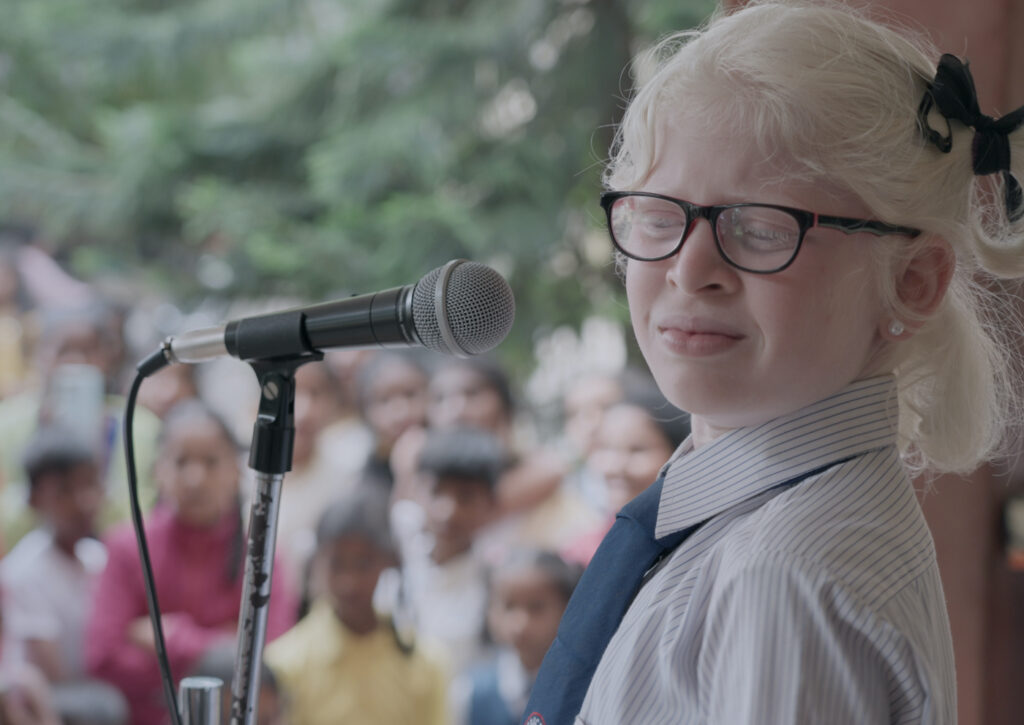Manohara K’s directorial debut made in Kannada, Mikka Bannada Hakki (Bird Of A Different Feather, 2024), is adapted from Sonia S’s autobiography of the same name and looks at a young girl’s coming-of-age against tremendous odds. Manohara presents an intimate portrait of the bleak reality of poverty and the sheer strength of will that is needed to prevail within it. While the narrative creates an organic experience that never feels pretentious, the cast of non-professional actors gives the film a rough, neorealist feel and lends much verisimilitude to the story.
Sonia (Jayashri) lives in a small house in a small village near Bengaluru. Her father, Kitty (Mahadev Hadapad), sells peanuts and is drunk most of the time while her mother, Devamma (Gayathri Heggodu), looks after all the household chores and her little brother, Rama as well. On her very first day in high school, Sonia is scolded by her teacher, Ashwini (Rekha Kudligi), for not wearing shoes, a ribbon tie, and a belt, which are part of the school uniform. She performs poorly academically, her notebooks being blank as she cannot follow the lectures delivered by the teachers. To add to her woes, she is an albino, making her an object of much scorn around. A visit to a doctor reveals that she has a problem with her vision, which is the real reason for her poor performance in class…
Mikka Bannada Hakki’s strongest aspect is its adhering to a subtle approach, offering a matter-of-fact look at the small triumphs of an ordinary individual’s efforts for a better life. Focusing on social and economic inequalities, the film highlights Sonia’s everyday struggles – from her little brother calling her blind to the discrimination she faces at school. However, we never observe her react violently at anyone for emotionally hurting her. Instead, she falls back on speaking to herself whenever she has to release her bottled-up anger. It serves as a coping mechanism, reassuring herself that she is normal when alone. As she participates in the school function as a stand-up comedian in the final section of the film, her sense of humour indicates the fragile balance between her psychological well-being and survival in a world that belittles her existence. The treatment of the film recalls the formal approach that is evident in the films of Prithvi Konanur, who is also one of the producers of the film.
Manohara portrays the school where Sonia studies as a microcosm of a society embedded in deep-seated prejudice and discrimination The teachers don’t attempt to understand Sonia’s condition and want her to behave like the other students. The seating arrangement for students is done according to their marks in the exam. Sonia is allocated a seat on the last bench, where due to her poor vision, is unable to read what is written on the blackboard. This highlights the tragic state of the education system in our country, which allows intelligent students to continue to shine while treating underachieving students with disdain. But once Sonia starts wearing glasses, she begins to perform better and when the teacher shifts her position by making her sit one row ahead, it is a small but highly significant achievement for Sonia. The school also becomes a place where Sonia builds the confidence to come to terms with herself and thereby negotiate with her circumstances.
Performance-wise, Jayashri gets into the skin of her character and gives a fine internal performance where her silences speak volumes. Rekha Kudligi gives a controlled and restrained performance while Gayathri Heggodu is strongly effective as a woman who has to think about her child’s future and manage her alcoholic husband simultaneously. The rest of the cast are spot on with their spontaneous and energetic performances.
The cinematography by Sanjay Channappa adopts the fly-on-the-wall approach and enhances the unobtrusive style of the film with its gritty, observational realism. Shivakumara Swamy’s editing imparts a rhythm and pace to the film that perfectly aligns with its form and content. Ravi Hiremath’s sound design creates an evocative aural space, utilizing the minute details of daily life.
Mikka Bannada Hakki is a searing indictment of a society that too often marginalizes its most vulnerable members. Through Sonia’s story, Manohara shines a harsh spotlight on the inequalities that pervade our society and forces us to confront uncomfortable truths about the nature of privilege and prejudice.
Mikka Bannada Hakki premiered today at the Shanghai International Film Festival, where it is nominated in five categories of the Asian New Talent Awards.
Update: Jayashri won the Best Actress Award at the Asian New Talents Awards at Shanghai.
Kannada, Drama, Color


